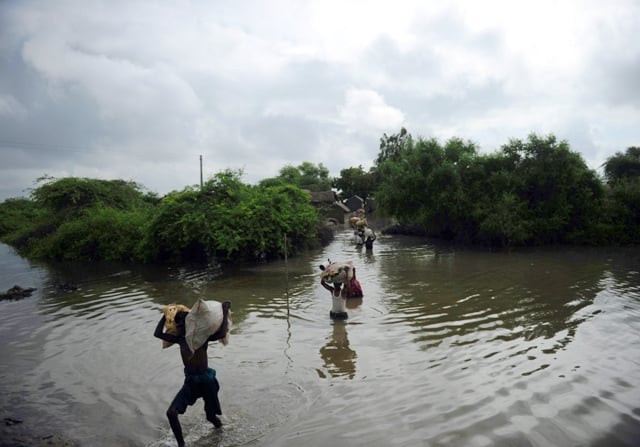‘Besides govt, 10% NGOs are also wrong’
CM adviser speaks at workshop to reflect upon the management of 2012’s floods.

He was speaking at a workshop, titled ‘Issues during Flood Emergency’, organised by the Participatory Development Initiatives (PDI) and the Oxfam Novib. Commenting on the participants’ view of the government’s relief and rehabilitation systems, Shaikh said that, “if things are 90 percent wrong in the government, then 10 percent wrong things also happen in the NGOs”.
The participants were discussing the relief work carried out by the Sindh and Balochistan governments after the rains in 2012, when Jacobabad district in Sindh, and Naseerabad and Jafarabad districts in Balochistan were flooded.
Shaikh said that the relief distribution system by the government was inefficient and corrupt, adding that it must be changed by involving local community-based organisations, notables and social welfare department in the relief distribution. A majority of international NGOs are only interested in collecting data instead of supporting the affected communities, he said.
Pakistan Muslim League-Functional MPA Nusrat Sehar Abbasi said that the government had completely failed to provide timely relief to the flood affected communities during the 2012 floods. Not only were the funds released late but there was rampant corruption in the relief funds, she claimed. Relief was only provided to potential voters, she added.
There may even be duplicity in the government as the relief department and the Provincial Disaster Management Authority are working as parallel departments, without any coordination with each other, she said.

Pakistan Peoples Party MPA Ayesha Khoso replied that the PPP government tried its best to support the flood affected communities, however, there were certainly some flaws. She said that there is a need to make the local government effective to improve disaster risk management, as well as, disaster relief mechanisms.
During his presentation former Sindh irrigation secretary Idrees Rajput disclosed that a lack of drainage system in Jacobabad was a major cause of flooding in the area. The Water and Power Development Authority (Wapda) is preparing a master plan to prevent the 2012 affected areas from floods in the future, he said.
Nevertheless, Rajput feared that this master plan may face the same fate as the plan to remove engorgements from the natural waterways, which was prepared last year, but could not be implemented.
Due to global climate changes, there is a strong need to redesign the irrigation infrastructure because Sindh is located on the lower basin, he added.
The participants were worried that more than two months have passed and some villages are still inundated. The affected residents from Balochistan blamed both their government and the humanitarian relief agencies for failing to provide adequate relief facilitates. They complained that they were living at the mercy of God.
Published in The Express Tribune, November 21st, 2012.


















COMMENTS
Comments are moderated and generally will be posted if they are on-topic and not abusive.
For more information, please see our Comments FAQ